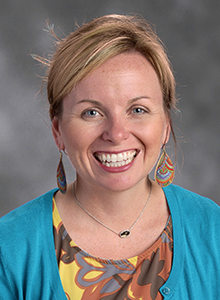Middle-Level Leadership Matters: Innovative Schedules in the COVID-19 Era
These best practices and resources help middle-level principals overcome common challenges.
With the launch of the new NAESP Centers for Advancing Leadership comes new opportunities for NAESP to help advance the leadership of its middle-level leaders. To start, we’re rolling out a new series, Middle-Level Leadership Matters, which aims to highlight innovative leaders from across the country—starting with me, Jessica Cabeen, one of the fellows of the Center for Middle-Level Leadership.
 Name: Jessica Cabeen, principal, Ellis Middle School in Austin, Minnesota
Name: Jessica Cabeen, principal, Ellis Middle School in Austin, Minnesota
Years in your current position: 3
Favorite Middle School Memory: Roller skating parties. We would load a bus from Ladysmith, Wisconsin, and drive 40 minutes to Rice Lake to the Roller Rink.
Why are you a middle-level leader?
As the former assistant principal at this school, I came back to Ellis Middle School after leading at our kindergarten center for six years. For the next five years, I will continue to have my former five-year-olds as current seventh- and eighth-grade scholars. Being able to build relationships at two impactful milestones of their youth is memorable and a lot of fun.
What current school practice are you most proud of?
Innovating our schedule during COVID.
When we made the shift to start the 2020 school year in a hybrid model (two days in school and three days at home), we recognized our current seven-period schedule would not be successful for students, parents, and staff in the reopening plan. Because of this, we flipped our seven-period day to a four-period block (mini-semester). Students take four courses a quarter for a 90-minute block. During the two days in person, they are engaging in active learning to extend the content that is delivered asynchronous (via Schoology), while also working collaboratively with peers in base groups and using playlists for more opportunities to engage in content in meaningful ways.
With this change, we had one new hour in our day. This allowed us space to create a new course: Academic Coach. During first and third quarters, all students participate in Academic Coach to enhance social-emotional learning (SEL), learn how to increase understanding of tech tools, and decrease the cognitive load of learning new tools and resources in isolation, as well as AVID lessons on self-determination, college readiness, and resiliency.
As the school leader, I signed on as the secondary teacher for a section of 20 eighth-grade students when we were running short of teachers for the course. Returning to the classroom for the first quarter during COVID-19 has let me see the challenges of teaching in this season while recognizing the successes of Ellis scholars as they find ways and resources to be successful in their at home and in school learning.
What Are My Top Takeaways?
- SEL is not an add-on but rather a foundational part of school. As we are returning back to school (in-person, online, or a combination of both), we need to focus on the social and emotional needs of all stakeholders. Everyone has been affected by COVID-19, so it is imperative that we recognize this and take time to work through these needs and not return to the same structure of school we knew before.
- Leaders can be learners. Committing to teaching during the first quarter was not an easy lift but instead instrumental in building a culture of collaboration, growth, and learning. By teaching a course that we were building each day, I had an intimate knowledge of how lessons were being delivered and could offer insight and guidance to other staff and families because I was living it with 20 students a week.
- Relationships are important—every single day. Focusing on SEL as learning ensures we are looking at the whole student, and helps us support families as they are navigating in-person learning, online learning, and everything in between.
What’s In My Resource Toolkit?
- SEE: Social-Emotional Curriculum: During the summer, we used this resource as a foundation for the work to create the curriculum.
- Becoming a Resilient Person: The Science of Stress Management and Promoting Wellbeing: Dr. Clay Cook teaches this free online course that offers practical strategies that can be implemented for students, staff, and school administrators during this stressful season.
- Search Institute’s Stressful Strain Relationships Check: Everything from the Search Institute is applicable to middle-level learners, and this specific tool has helped us build bridges between students and adults, in school and at home.
Who’s in My Professional Learning Network?
- Search Institute: Great blogs, resources, and research to support student engagement and meaningful relationships with families.
- Lana Peterson: Lana works at the University of Minnesota in the Learning Technology department and offers resources for all educators in regard to best practices in a new season of teaching and learning.
- Steven Weber: An associate superintendent, Steven shares his learning in leadership with resources and research.
Next month you’ll her from Center for Middle-Level Leadership Kevin Armstrong. Following that, it’s your turn to share. Stay tuned for details on how to take part.
Jessica Cabeen is a middle school principal and fellow of NAESP’s Center for Middle-Level Leadership.